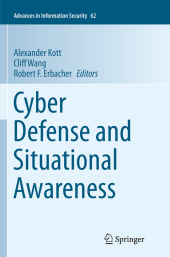 Neuerscheinungen 2016Stand: 2020-02-01 |
Schnellsuche
ISBN/Stichwort/Autor
|
Herderstraße 10
10625 Berlin
Tel.: 030 315 714 16
Fax 030 315 714 14
info@buchspektrum.de |

Robert F. Erbacher, Alexander Kott, Cliff Wang
(Beteiligte)
Cyber Defense and Situational Awareness
Herausgegeben von Kott, Alexander; Wang, Cliff; Erbacher, Robert F.
Softcover reprint of the original 1st ed. 2014. 2016. xvii, 329 S. 28 SW-Abb., 56 Farbabb., 17 Tabellen
Verlag/Jahr: SPRINGER, BERLIN; SPRINGER INTERNATIONAL PUBLISHING 2016
ISBN: 3-319-38026-5 (3319380265)
Neue ISBN: 978-3-319-38026-1 (9783319380261)
Preis und Lieferzeit: Bitte klicken
This book is the first publication to give a comprehensive, structured treatment to the important topic of situational awareness in cyber defense. It presents the subject in a logical, consistent, continuous discourse, covering key topics such as formation of cyber situational awareness, visualization and human factors, automated learning and inference, use of ontologies and metrics, predicting and assessing impact of cyber attacks, and achieving resilience of cyber and physical mission. Chapters include case studies, recent research results and practical insights described specifically for this book. Situational awareness is exceptionally prominent in the field of cyber defense. It involves science, technology and practice of perception, comprehension and projection of events and entities in cyber space. Chapters discuss the difficulties of achieving cyber situational awareness - along with approaches to overcoming the difficulties - in the relatively young field of cyber defense where key phenomena are so unlike the more conventional physical world. Cyber Defense and Situational Awareness is designed as a reference for practitioners of cyber security and developers of technology solutions for cyber defenders. Advanced-level students and researchers focused on security of computer networks will also find this book a valuable resource.
Preview.- Foundations and Challenges.- Cyber and Kinetic.- Formation of Awareness.- Network-wide Awareness.- Cognition and Technology.- Cognitive Process.- Visualization and Analysts.- Inference and Ontology.- Learning and Semantics.- Impact Assessment.- Attack Projection.- Metrics of Security.- Mission Resilience.- Concluding Thoughts.


